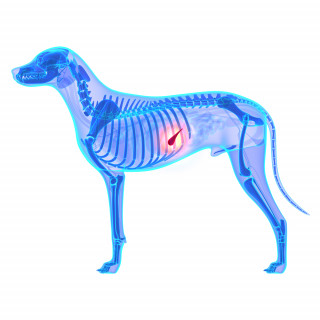We're here to help

What is pancreatitis in dogs?
Pancreatitis in dogs occurs when the pancreas (a small organ that sits behind the small intestine and the stomach) is inflamed and swollen. Its purpose is to help dogs digest food and regulate their blood sugar.
Dogs with severe pancreatitis are likely to suffer from symptoms including a loss of appetite, sickness, diarrhoea and lethargy. They may also show signs of abdominal pain and dehydration. In milder forms, symptoms aren’t quite as obvious but may still include loss of appetite, lethargy, and diarrhoea. During an attack of pancreatitis, dogs may hunch their back, holding their rear end in the air with their front legs and head lowered onto the floor.
Pancreatitis is typically described as chronic or acute, with chronic meaning the condition has developed over time while acute is when it appears suddenly.
What to do if you're worried your dog has pancreatitis?
The prognosis for pancreatitis depends on the severity of the disease. Mild cases may just require a change of diet while more severe cases will need urgent aggressive treatment. If left untreated, pancreatitis may lead to severe organ damage and even sudden death. As a result, you should contact your vet straight away if your dog or puppy is showing signs of the disease.

What causes pancreatitis in dogs?
It’s often difficult to pinpoint the exact cause of pancreatitis. One of the most common risk factors is scavenging and sometimes the condition is triggered when a dog eats foods high in fat. Severe trauma or surgery can also lead to pancreatitis and it’s been linked to the use of some drugs. Cushing’s disease, infections such as Babesia canis or Leishmania, and high blood levels of fats called triglycerides, have also been listed as risk factors.
Are some breeds more likely to get pancreatitis?
There is a higher prevalence of pancreatitis in cocker spaniels, Dachshunds, miniature Schnauzers, poodles and Yorkshire terriers.
Canine pancreatitis treatment
If your vet can pinpoint the cause of your dog’s pancreatitis, it’s likely they will treat it first. If this isn’t possible, they will provide supportive veterinary care and ensure your dog is monitored carefully. Pain relief is likely to be prescribed to dogs suffering abdominal pain and medication may also be given to reduce pancreatic inflammation and to stop vomiting and nausea. In some cases, vets may recommend no food or water for at least 24 hours. This is done in order to give the pancreas a rest. One of the most common treatments for pancreatitis is intravenous fluids to maintain normal fluid and electrolyte balance.

What is necrotising pancreatitis?
In the case of necrotising pancreatitis, a very severe and complicated form, portions of the pancreas are destroyed.
How is pancreatitis in dogs diagnosed?
Your vet may be able to give you a provisional diagnosis of pancreatitis based on your dog’s history and symptoms. But because these symptoms can be quite common, they’ll need to run various tests to support their decision. These tests are likely to include a specific blood test called a canine pancreatic lipase. They may also carry out abdominal x‑rays or an ultrasound scan.
How long can a dog live with pancreatitis?
Life expectancy for dogs diagnosed with pancreatitis is difficult to predict. In mild, uncomplicated cases, the prognosis is usually good, with most patients going on to make a full recovery. This is especially the case if high-fat diets are avoided and good veterinary and nursing care is provided. But in more serious cases the prognosis is guarded. This is partly because dogs with severe pancreatitis often have frequent acute episodes or complicating factors such as hypothermia, acidosis, hypocalcemia, and single or multiple-organ failure.
Pancreatic cancer in dogs
Several types of cancer have been reported in the pancreas. These tumours can be either benign or malignant. The most common form of malignant pancreatic cancer in dogs is called pancreatic adenocarcinomas. These tumours do not respond well to treatment and are often not detected until the cancer has already spread.
The other common form is pancreatic adenomas. These are benign tumours which don’t spread. In rare cases, these can cause problems but the outlook for dogs with pancreatic adenomas is excellent.

